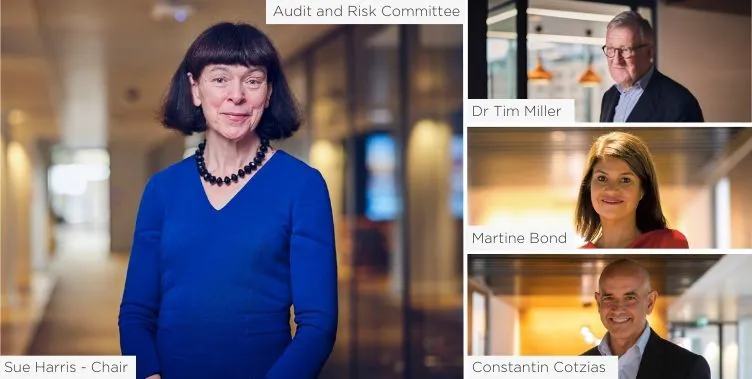Our strong governance framework is our starting point for meeting our purpose and overseeing our strategy. It underpins how the Board fulfils its responsibilities, with each committee playing a distinct, yet key, role.
Governance framework
Board
Nomination Committee
Audit and Risk Committee
Remuneration Committee
Executive Team
Structure
Key matters reserved for the Board:
-
Purpose
-
Strategy
-
Setting the Group’s culture, standards and values
-
Internal controls and risk management
-
Financial reporting and viability
-
Capital and liquidity
-
Board and Committee appointments
-
Corporate governance matters
-
ESG & stakeholder matters
-
Material contracts.
View the Schedule of Matters Reserved for the Board here.
Chair
- Leads the Board, facilitating the contribution of all Directors and promoting an open and constructive relationship between the Executive and Non-Executive Directors
- Ensures the effectiveness of the Board
- Oversees the development of the Group’s purpose, values and culture
- Promotes high standards of corporate governance
- Available to shareholders and fosters dialogue with other key stakeholders.
Senior Independent Director
- Acts as a sounding board for the Chair and leads the evaluation of his performance
- Serves as a trusted intermediary for other Non-Executive Directors
- Available to shareholders, particularly when their concerns have not been resolved through other channels.
Chief Executive Officer
- Responsible for the day-to-day management of the Group
- Develops the strategy and commercial objectives for approval by the Board, and leads the management in delivering them within the risk appetite approved by the Board
- Promotes the embedding of the Group’s culture throughout the organisation
- Leads the relationship with institutional investors and other stakeholders.
Independent Non-Executive Directors
- Contribute to the development of the strategy and scrutinise its execution by management
- Provide both objective and constructive challenge, and support, to the development of Board proposals and the performance of management.
- Monitor management’s progress against agreed
performance objectives.
Chief Financial Officer & Chief Operating Officer
- Manages the Group’s financial and operational affairs and supports the CEO in the management of the Group
- Alongside the CEO, represents the Group in meetings with institutional shareholders and other stakeholders.
- In conjunction with the CEO, takes responsibility for overseeing all ESG matters.
Employee Engagement Director
- Facilitates two-way communication between the Board and the workforce through a programme of engagement initiatives
- Enhances the voice of the workforce by feeding their views into the Board decision-making process.
View the Roles of the Chair, Chief Executive Officer, Senior Independent Director and Employee Engagement Director here.
- Acts as first point of contact for the Chair and Non-Executive Directors, and facilitates the induction of new Non-Executive Directors
- Facilitates information flows between the Board and its Committees, and between management and the Board
- Advises the Board on all governance matters and ensures good governance practices throughout the Group.
- Assists the CEO in running the business and delivering the strategy
- Develops and implements strategy and goals, operational plans, procedures and budgets, and monitors business performance (including competitive pressures)
- Oversees the assessment and control of risk.
Committees

- Reviews the effectiveness of the Board, and its structure, size, composition and diversity.
- Leads succession planning for the Board and oversees succession plans for senior management.

- Monitors the integrity of the financial reporting for the Group and manages the relationship with the External Auditor.
- Oversees the effectiveness of the risk management and internal control systems.

- Sets the remuneration policy and packages for the Executive Directors and other members of the senior management team, whilst having regard to pay across the Group.
- Approves the remuneration of the Chair.

